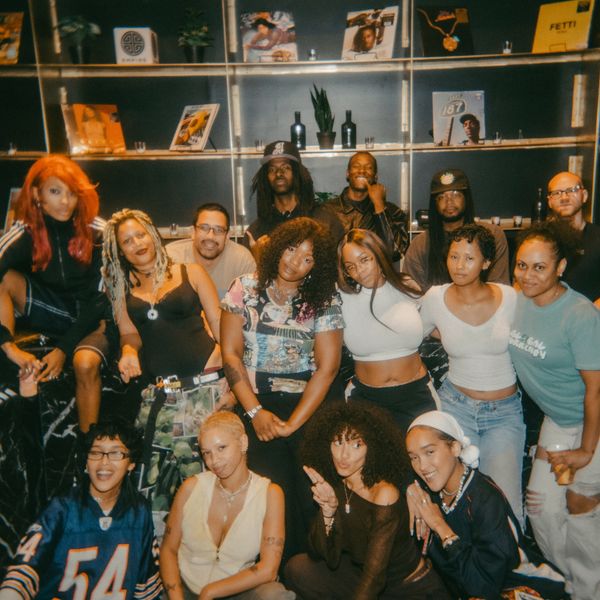
Interviews From Aluna's Noir Fever Writing Camp
By Joan Summers
Sep 17, 2024The electronic music world is undergoing a revolution. Aluna and her label Noir Fever have found themselves at the forefront of that seismic shift, along with the many Black electronic musicians, DJs and producers who have found themselves pulled into orbit around the two.
PAPER was invited to attend dance music pioneer Aluna’s first-ever writing camp at EMPIRE’s recording compound in San Francisco. The events of the week culminated in a massive performance at the iconic 1015 Folsom, featuring many of the attendees — and myself, side stage, attempting to shake ass in a way that still read professional, even if my job is technically the club.
The camp, set over five days, brought together Black artists from across the country and world to EMPIRE’s sprawling, recently renovated studio complex (Aluna’s own label Noir Fever formally partnered with Empire in 2023). There, they wrote, recorded and finished a plethora of songs that broke Aluna and EMPIRE’s own expectations for the camp.
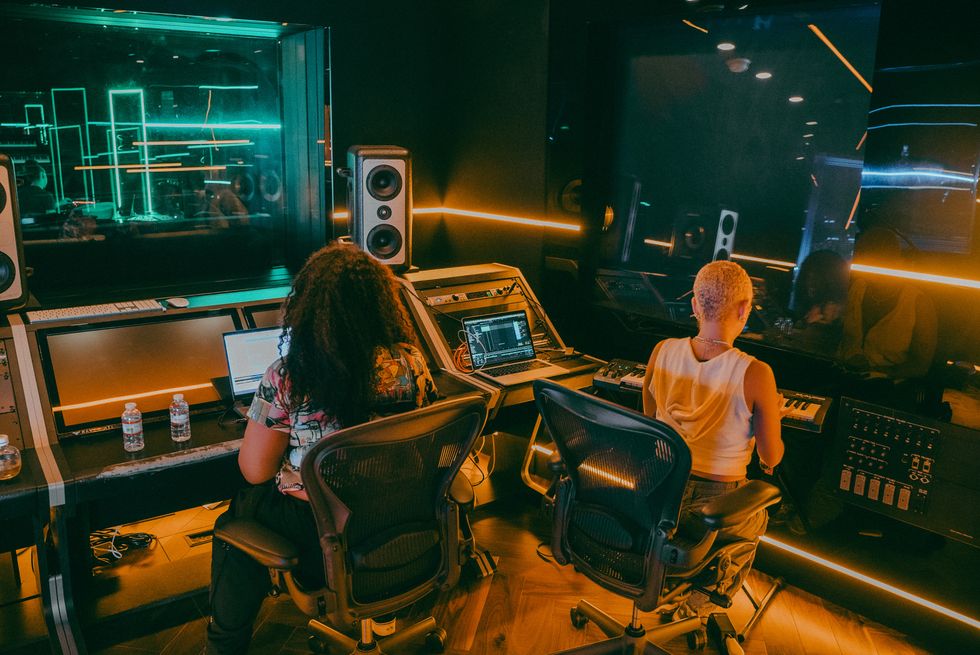
The following series of questions and answers were compiled from various attendees I managed to squeeze in time with regarding their experiences at the camp. Some, like Los Angeles DJ and party darling baby.com, found themselves broken out of their shells or challenged to grow their sound and artistry in ways they hadn’t thought possible. Others, like Noir Fever’s own AQUTIE, found it an opportunity to build community and share her unique perspective on South African house music. “There’s still so much people have to learn about South African music," AQUTIE told us. "People love to party and dance and have a good time, and that’s a big part of the music that we make, a part of the culture. People are seeing that, and seeing how different it is, like how house music is translated out there.”
I caught RaeCola, twin electronic maestros, in a session with baby.com and Farrah Fawx. They tell me of their work during the week: “Each thing has been really unique," RaeCola said. "We got a little girl group song, 'Acapulco' and we have one we made with Aluna that has a Jersey club feel to it and she jumped on it. We even have a track that just of the two of us did together called 'Spice Girls,' it’s really fun and sick.”
There’s more, of course, and releases I eagerly await, having heard drafts I found myself sucked into the maelstrom of creative energy at work in the studios, ideas flying faster than the beats blasting through the speakers.
Read my conversations with AQUTIE, baby.com, Farrah Fawx, Paulina Singer and RaeCola below.
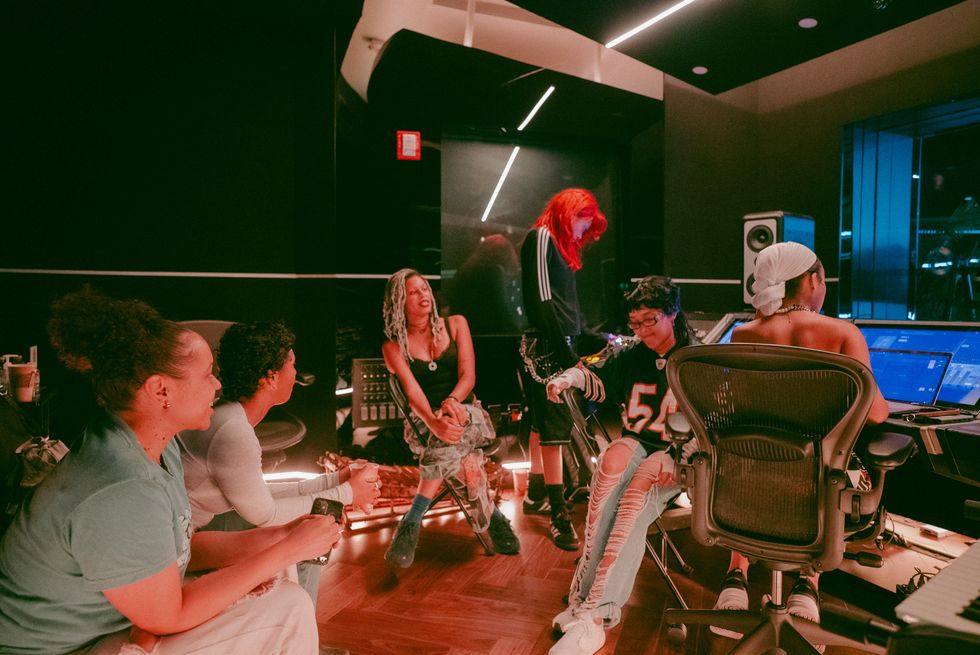
How did you link up with Noir Fever for this writing camp?
AQUTIE: I met Aluna through the scene, and we have a mutual friend who was like, "Yo, you two should meet. You’re both making music, and I feel like you guys would make some really fire stuff together." We did an event at Elsewhere, and it was fabulous. It was all women, because Aluna pioneers women of color, femmes, in these spaces, that are doing dance music. We just enjoyed each other’s work. Aluna was also pivotal in my schooling, my career, so being able to connect with her in that way, and her enjoying what I was doing, was really really great — to meet someone with a like mind, someone that is talented, someone that I also admire in this space.
Farrah Fawx: I had just linked with Empire Dance on the distribution of my new project, and this opportunity came about, and it was dope because I’ve been a fan of what Aluna’s been doing. Especially what she’s cultivated with Noir Fever, and bringing all these beautiful, melanated people in the dance space together.
Paulina Singer: I was invited after I did this song with AQUTIE that they released under Noir Fever, and that’s how I met Aluna and all the people that work with her.
baby.com: I have lived in LA about five years now. When I first moved there, I had taken a big break DJing until I got introduced to somebody named Foreigner. If you’ve ever been to LA or are in the party scene at all, you know Foreigner is a huge name. I DJed his birthday party, and he saw me, enjoyed me as a DJ, and he’s put me on to so many other things since then. One of the things that he put me on to was Aluna’s performance last year at The Fonda Theatre. They had me open up for her, and that was our first time meeting, and I’ve been locked in with Noir Fever ever since.
RaeCola: We got connected with Noir Fever in a group chat of different Black and brown artists. Aluna actually reached out to us, and we had been fans of her for the longest, so that was really cool, that she was even participating in the group, because they added a bunch of bigger artists. We’re like, wait, she's actually trying to connect with people here. She asked us what we were working on, and we did a couple festivals, and were in the same lineup. She had asked us about sending her tracks for Noir Fever, and we sent over a big batch of tracks like, last year or so, and there was a couple that she had liked. After seeing her a couple times, and talking about what we were working on, we got in the studio like two months ago and got to finish one of the tracks. Now we’re here!
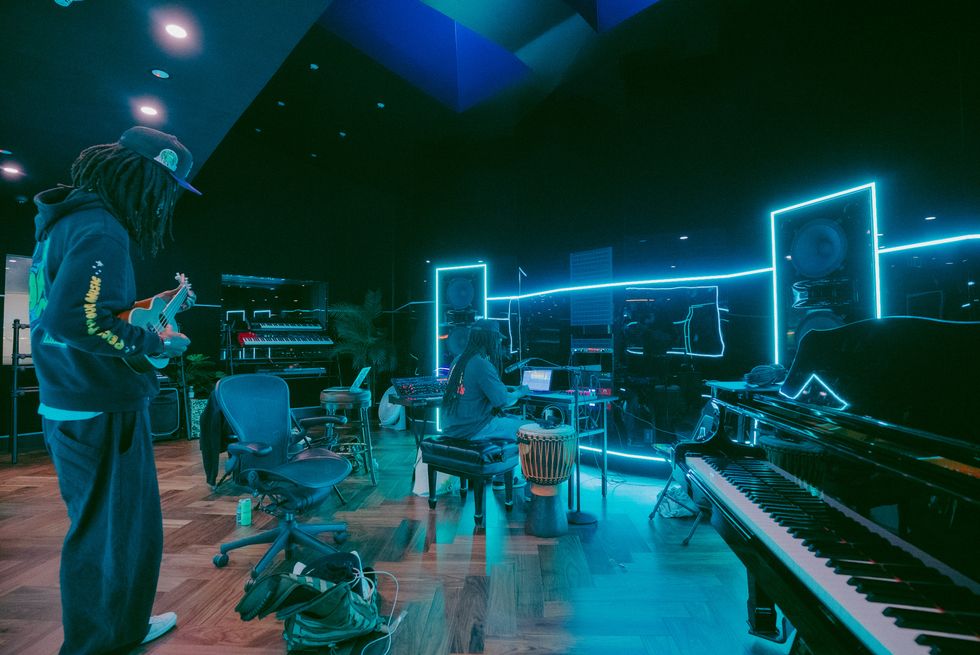
How did you get into DJing, or making music?
AQUTIE: I’m South African, and South Africa is big on house music. I know Chicago created it, I know about Detroit, but South Africa, we are the mecca. It’s insane how much house music is the main focus musically in South Africa. Just growing up, I already had that in me, the disco, the house music, before I started making electronic music. I was DJing open format, playing all kinds of genres, in college. As I got older, I was like, I actually want to incorporate house music into my sets, so I would start playing a lot more house music, a lot of South African house music. I decided to go full blown house music and from then on, it’s been great. With house, you can be so experimental, love that it gave me the freedom to do what it is I want and express myself in a way where there’s no real formula.
baby.com: I started DJing first. DJing was definitely my first love, and always will be. But I felt like I needed new ways to express myself, so I just started getting into poetry. I love to write, in general. I love storytelling and things like that, and because I was already a writer, I was already doing poetry, and as I was DJing, I was like: What if I try to make a song? I like to talk shit, I'm an Aries, that’s why I like to do so many different things. I like to rap, I like to make girls put their hands on their knees, but I also sing about things that don’t necessarily sound good on top of an 808. I don’t try to limit myself, I just like to express it in whatever way it wants to come out.
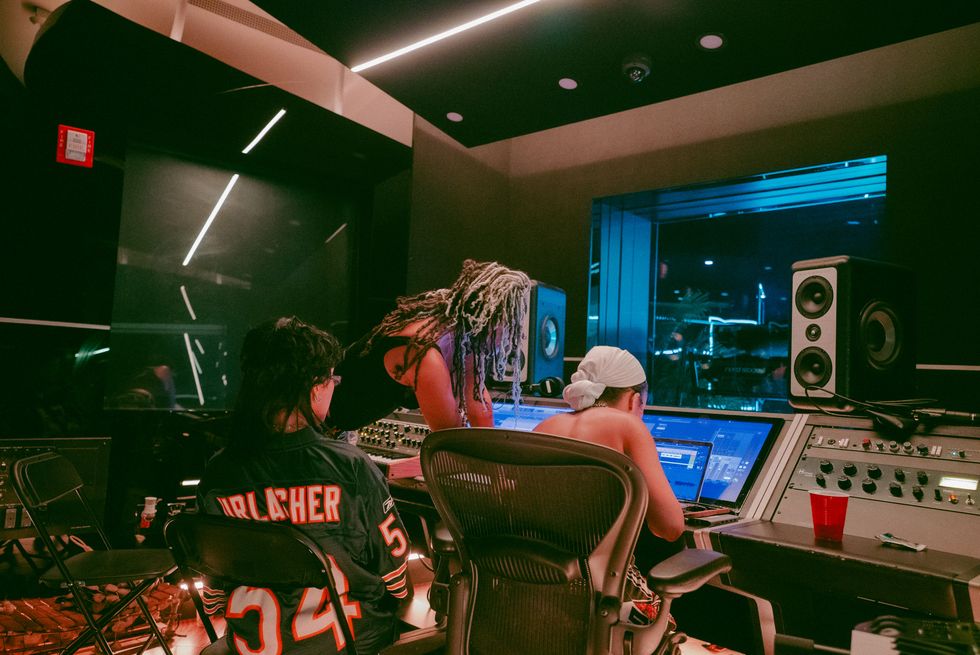
What is your experience of the camp been like?
AQUTIE: The writing camp was just the inspiration I needed. Honestly, it was like… where do I even start? The fact that it was mostly women and femmes of color, that was a part of it obviously, and there were a few other guys there as well. But they really let us take the lead, and they let us shine through and do our thing, while also giving input. Day one we were just making fire, it was crazy. I didn’t really know what to expect when I came into the camp, I knew it was going to be a fabulous experience. I was also able to have my homegirl Paulina Singer here, who is a good friend of mine, from before we even started making music together. We always said to each other, we’re going to make music together, we don’t know when, but it’s going to happen. So now the fact that she’s on my EP, she came to the writing camp, and we were able to work on new things, and some older ideas we had, was really fabulous.
baby.com: Honestly, it’s opened my eyes to the ways that the world can be, that it isn’t right now. I feel like I live in this world where I’m like, I really want to save the world, you know? I really want to see things change, and it feels impossible to do that. Checking Instagram in the morning, seeing how the world can be, truly, is so hard. I don’t know. Noir Fever is really changing things, setting new standards. Aluna is really doing it, bringing together so many female producers, getting on tracks with them, teaching us things, literally showing us the ropes and actually doing it. Actually making this world that feels more fair, cooler.
Farrah Fawx: I believe in aligning with people who are masters of their craft, so that’s why this space is so cool, because there’s so many people who are DJs, that are producers as well, but that experience as DJs lends to that. I’m not gonna try and become the DJ for this record when there’s so many dope DJs here, like baby.com, or Uniiqu3. It’s been really cool to be in a space that allows self expression, judgment free, if you want to go and touch the boards for the first time. I was talking to two of the girls here, and they’re like, we’re DJs, but we need to learn to produce. I was like, that’s dope, that this environment encourages that.
Paulina Singer: My body is tired, but my soul feels energized. My soul feels so filled from being here, because I very much am a person who believes that your work should be fun. Anything that you’re doing to sustain yourself, or to keep growing in any capacity, financially, mentally, spiritually, should be fun. There’s hard work involved always,there's always going to be contrast. There’s always going to be things you come up against. The basis, the ground level, should be like: “Well, I really love what I’m doing, period. So doing that 12 hours a day, days in a row, is just so magnificent. And the people here, like the fact that it’s so focused on women, and dance music, it feels God orchestrated, you know? It feels like the vibration of what this is all about, life is all about.
RaeCola: We didn’t really know what to expect coming here, but I think all the people that they brought together, it just feels like really good synergy. It’s such a place of people wanting to just create. We’re also hungry being here, and we’ll stay in the studio ‘til literally 3AM and they kick us out. I feel like the variety and genres they brought together have also brought out different elements within each of us, which is really cool. It’s nice when we listen to the tracks and you can hear everyone’s sound within it, and I feel like it’s only been four days. I don’t know if it’s the feminine energy, but I think that definitely plays into it a lot. It’s unique. I haven’t been in a studio session like this ever in my life, where there’s all females, you know?
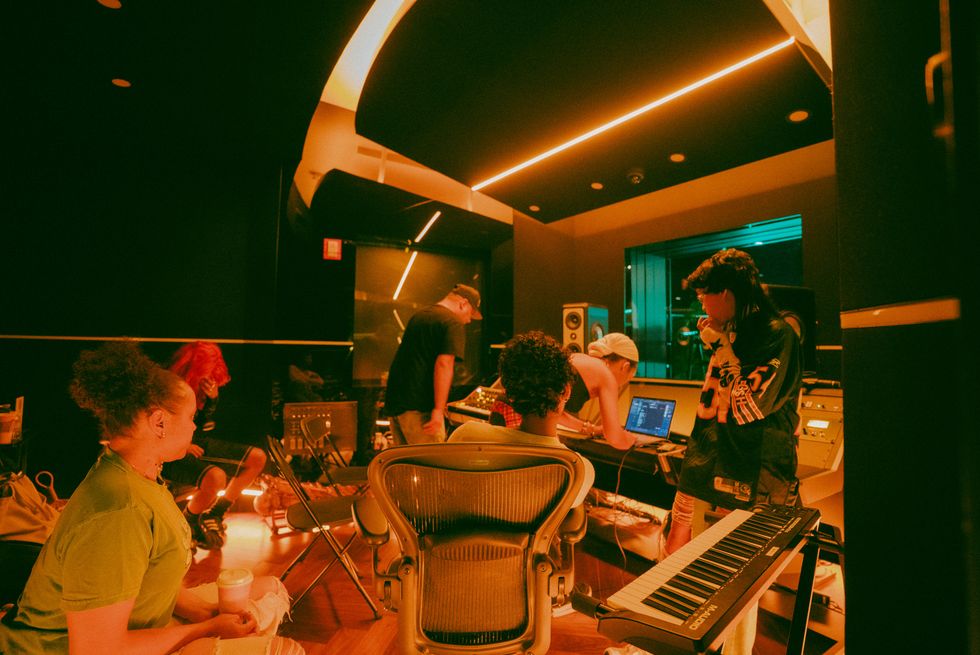
Has the camp, and being around Aluna and the others, affected your artistry at all, or forced you to try new things?
RaeCola: I feel like we are definitely establishing our sound. We all have such diverse palettes. You have someone who does Afrobeat, or there’s Paulina, who has this amazing, beautiful voice. It allows us to think of something that I wouldn’t have just created on my own. Even Brandon Banks, he was playing guitar, and it was something that isn’t necessarily our style, but together, we created something really cool. We’re like, where do our worlds meet?
Farrah Fawx: I think being with people that are so strong in their sound and their capabilities will stretch me in how I create, as well as the opportunity to take these relationships and foster them after the camp is over. I love that everybody here has something going on outside of music, creating events and spaces to bring community together, DJ, the nightlife, always something to step into without just creating and being in the studio.
Paulina Singer: I think probably my sound has grown because of all the connections. When you meet somebody, they bring out a new side of you, so that’s huge. I think really what has happened is my ability to be free in the booth, and be jump started. I was saying this yesterday: There’s so many different avenues, different locations, where and how you can record, where you can sing. I do so much of it in my bedroom, and I don’t want five or six producers in my bedroom. I love being in the studio with a vocalist here, writer here, producer, engineer, all these people in the same room.
baby.com: Noir Fever and Aluna know that I’ve been in a bit of a shell again. It was a rough year, and music wasn’t coming easy to me at all, which is so scary, you know, when it usually comes so easy to you. I started to burrow a bit, and I realized music is so integral to who I am, that without it, I was feeling weird. Usually when I make music, I do not work with anybody, I’m in my room by myself. This is the first time really stepping into a room full of writers and producers and bouncing ideas off each other, learning from each other. It’s exposed me to a whole new way of making music. I just recorded a really cute rap song. I’m coming up with little bars in my head, and I haven’t really laid some down in a while, so just in general, putting my voice on a microphone again and feeling comfortable and getting in the studio and playing it back and throwing it back. That has me really excited, I’m loving the song that I just recorded.
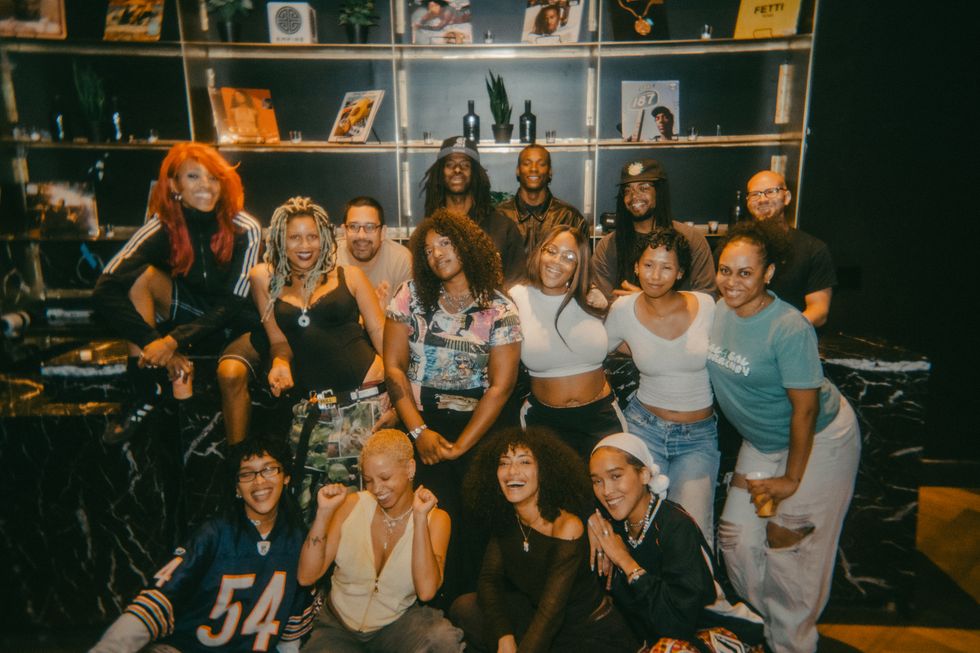
Noir Fever started in part after Aluna wrote her searing open letter on the state of dance music in 2020. I’d love to know your perspective on that mission statement.
AQUTIE: It’s important, knowing that house music is Black. It’s important to always bring that narrative back, to remind people this is our stuff. Women right now, we are in our own little renaissance. Even just in the music space, period, you’re seeing more producers, you’re seeing more DJs, you’re seeing more women in the studio. Noir Fever is literally bringing us into these spaces and letting people know, "Yo, this is happening." They showed and proved it. I feel like that’s the best way to do it. They’re living out their mission statement.
Farrah Fawx: The truth is, dance music really came from Black and queer people. Like, “Hey, this is a sound that comes from this space! This is a sound that is also represented by these people!” I think the conversation, and where Aluna was coming from, was: We need to own this. We need to be loud about it. We need to be forward and front it.
Paulina Singer: I think this is so serendipitous. There’s people here from all over the world, places that I probably just wouldn’t have gone. So many different kinds of music tastes and life experiences and ways of using the programs, I’m just learning so much.
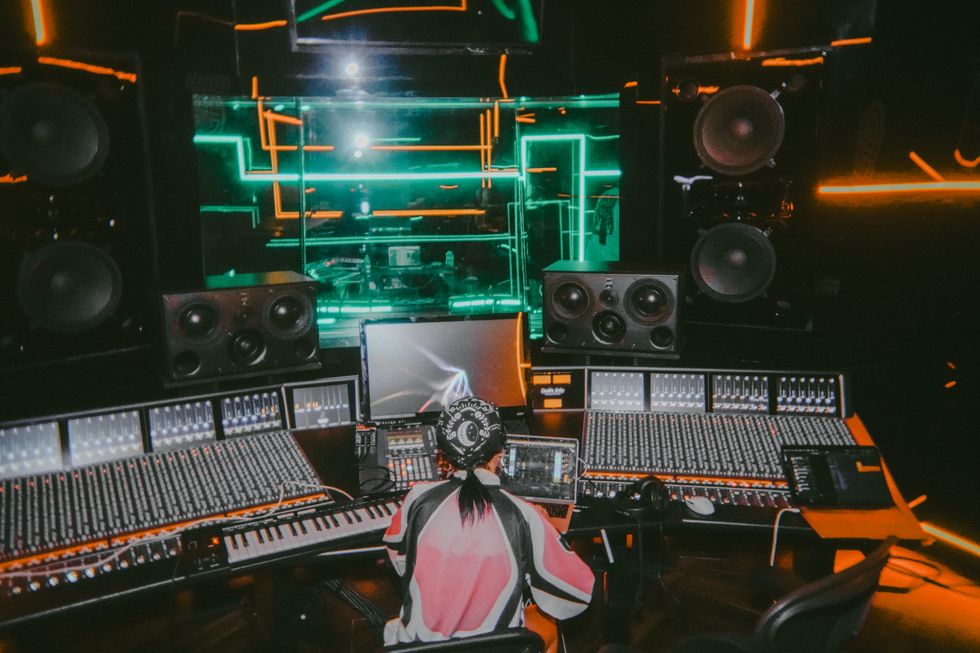
Have you been able to work with Aluna at all since you’ve been here?
AQUTIE: Yeah! I also dropped my EP, Coolest in the City, under her label, and then we made “Ghostin’” the bonus deluxe track, which just came out. Once I sent her the beat, she was like, "Oh yeah, this is sexy." I said, "I know boo! I know! I knew you would like it." Even with “Ghostin’,” we literally sat there, got the words and lyrics together, the flows, the melodies. She’s one that is willing to learn from others. Sometimes you might work with an artist and they have their own vision, but it’s really nice to work with Aluna, because she’s open minded, and she’s always open to hearing new ideas. Working with her is a pleasure.
Paulina Singer: She was about to leave one night, and she was like, "Zuzu, we want you to do this track we’re making." I was so tired, and my ride was leaving, and I was like, I literally couldn’t say no in any realm. I stayed, and it was such a great song. Jah produced it, and he’s so fantastic. Then the next day, him and AQUTIE worked on it, and I laid down vocals. It was so fun, and Aluna came in the next day, and I was like, "Wait, did you want to coach me, do you want to hear it?" She was like, "No, it’s your song now, go for it." I was like, "Okay, we’ll fly out the nest I hope." It was great! I’m really excited to finish it.Photography: Ernesto Garcia
From Your Site Articles
Related Articles Around the Web
MORE ON PAPER
ATF Story
Madison Beer, Her Way
Photography by Davis Bates / Story by Alaska Riley
Photography by Davis Bates / Story by Alaska Riley
16 January
Entertainment
Cynthia Erivo in Full Bloom
Photography by David LaChapelle / Story by Joan Summers / Styling by Jason Bolden / Makeup by Joanna Simkim / Nails by Shea Osei
Photography by David LaChapelle / Story by Joan Summers / Styling by Jason Bolden / Makeup by Joanna Simkim / Nails by Shea Osei
01 December
Entertainment
Rami Malek Is Certifiably Unserious
Story by Joan Summers / Photography by Adam Powell
Story by Joan Summers / Photography by Adam Powell
14 November
Music
Janelle Monáe, HalloQueen
Story by Ivan Guzman / Photography by Pol Kurucz/ Styling by Alexandra Mandelkorn/ Hair by Nikki Nelms/ Makeup by Sasha Glasser/ Nails by Juan Alvear/ Set design by Krystall Schott
Story by Ivan Guzman / Photography by Pol Kurucz/ Styling by Alexandra Mandelkorn/ Hair by Nikki Nelms/ Makeup by Sasha Glasser/ Nails by Juan Alvear/ Set design by Krystall Schott
27 October
Music
You Don’t Move Cardi B
Story by Erica Campbell / Photography by Jora Frantzis / Styling by Kollin Carter/ Hair by Tokyo Stylez/ Makeup by Erika LaPearl/ Nails by Coca Nguyen/ Set design by Allegra Peyton
Story by Erica Campbell / Photography by Jora Frantzis / Styling by Kollin Carter/ Hair by Tokyo Stylez/ Makeup by Erika LaPearl/ Nails by Coca Nguyen/ Set design by Allegra Peyton
14 October




